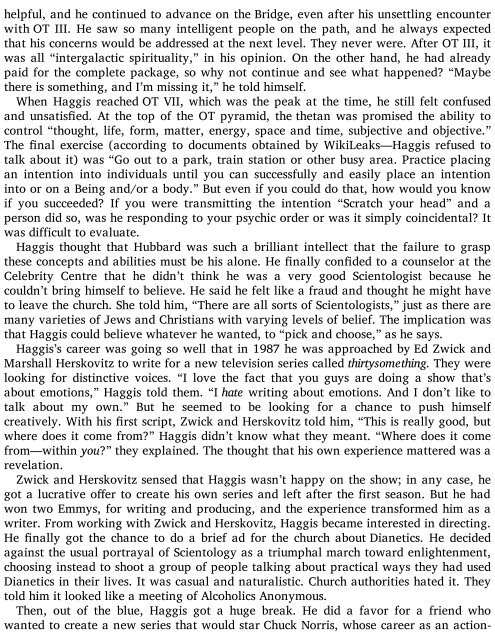going-clear-scientology-hollywood-and-the-prison-of-belief-by-lawrence-wright-2
going-clear-scientology-hollywood-and-the-prison-of-belief-by-lawrence-wright-2
going-clear-scientology-hollywood-and-the-prison-of-belief-by-lawrence-wright-2
Create successful ePaper yourself
Turn your PDF publications into a flip-book with our unique Google optimized e-Paper software.
helpful, <strong>and</strong> he continued to advance on <strong>the</strong> Bridge, even after his unsettling encounter<br />
with OT III. He saw so many intelligent people on <strong>the</strong> path, <strong>and</strong> he always expected<br />
that his concerns would be addressed at <strong>the</strong> next level. They never were. After OT III, it<br />
was all “intergalactic spirituality,” in his opinion. On <strong>the</strong> o<strong>the</strong>r h<strong>and</strong>, he had already<br />
paid for <strong>the</strong> complete package, so why not continue <strong>and</strong> see what happened? “Maybe<br />
<strong>the</strong>re is something, <strong>and</strong> I’m missing it,” he told himself.<br />
When Haggis reached OT VII, which was <strong>the</strong> peak at <strong>the</strong> time, he still felt confused<br />
<strong>and</strong> unsatised. At <strong>the</strong> top <strong>of</strong> <strong>the</strong> OT pyramid, <strong>the</strong> <strong>the</strong>tan was promised <strong>the</strong> ability to<br />
control “thought, life, form, matter, energy, space <strong>and</strong> time, subjective <strong>and</strong> objective.”<br />
The nal exercise (according to documents obtained <strong>by</strong> WikiLeaks—Haggis refused to<br />
talk about it) was “Go out to a park, train station or o<strong>the</strong>r busy area. Practice placing<br />
an intention into individuals until you can successfully <strong>and</strong> easily place an intention<br />
into or on a Being <strong>and</strong>/or a body.” But even if you could do that, how would you know<br />
if you succeeded? If you were transmitting <strong>the</strong> intention “Scratch your head” <strong>and</strong> a<br />
person did so, was he responding to your psychic order or was it simply coincidental? It<br />
was difficult to evaluate.<br />
Haggis thought that Hubbard was such a brilliant intellect that <strong>the</strong> failure to grasp<br />
<strong>the</strong>se concepts <strong>and</strong> abilities must be his alone. He nally conded to a counselor at <strong>the</strong><br />
Celebrity Centre that he didn’t think he was a very good Scientologist because he<br />
couldn’t bring himself to believe. He said he felt like a fraud <strong>and</strong> thought he might have<br />
to leave <strong>the</strong> church. She told him, “There are all sorts <strong>of</strong> Scientologists,” just as <strong>the</strong>re are<br />
many varieties <strong>of</strong> Jews <strong>and</strong> Christians with varying levels <strong>of</strong> <strong>belief</strong>. The implication was<br />
that Haggis could believe whatever he wanted, to “pick <strong>and</strong> choose,” as he says.<br />
Haggis’s career was <strong>going</strong> so well that in 1987 he was approached <strong>by</strong> Ed Zwick <strong>and</strong><br />
Marshall Herskovitz to write for a new television series called thirtysomething. They were<br />
looking for distinctive voices. “I love <strong>the</strong> fact that you guys are doing a show that’s<br />
about emotions,” Haggis told <strong>the</strong>m. “I hate writing about emotions. And I don’t like to<br />
talk about my own.” But he seemed to be looking for a chance to push himself<br />
creatively. With his rst script, Zwick <strong>and</strong> Herskovitz told him, “This is really good, but<br />
where does it come from?” Haggis didn’t know what <strong>the</strong>y meant. “Where does it come<br />
from—within you?” <strong>the</strong>y explained. The thought that his own experience mattered was a<br />
revelation.<br />
Zwick <strong>and</strong> Herskovitz sensed that Haggis wasn’t happy on <strong>the</strong> show; in any case, he<br />
got a lucrative oer to create his own series <strong>and</strong> left after <strong>the</strong> rst season. But he had<br />
won two Emmys, for writing <strong>and</strong> producing, <strong>and</strong> <strong>the</strong> experience transformed him as a<br />
writer. From working with Zwick <strong>and</strong> Herskovitz, Haggis became interested in directing.<br />
He nally got <strong>the</strong> chance to do a brief ad for <strong>the</strong> church about Dianetics. He decided<br />
against <strong>the</strong> usual portrayal <strong>of</strong> Scientology as a triumphal march toward enlightenment,<br />
choosing instead to shoot a group <strong>of</strong> people talking about practical ways <strong>the</strong>y had used<br />
Dianetics in <strong>the</strong>ir lives. It was casual <strong>and</strong> naturalistic. Church authorities hated it. They<br />
told him it looked like a meeting <strong>of</strong> Alcoholics Anonymous.<br />
Then, out <strong>of</strong> <strong>the</strong> blue, Haggis got a huge break. He did a favor for a friend who<br />
wanted to create a new series that would star Chuck Norris, whose career as an action-


